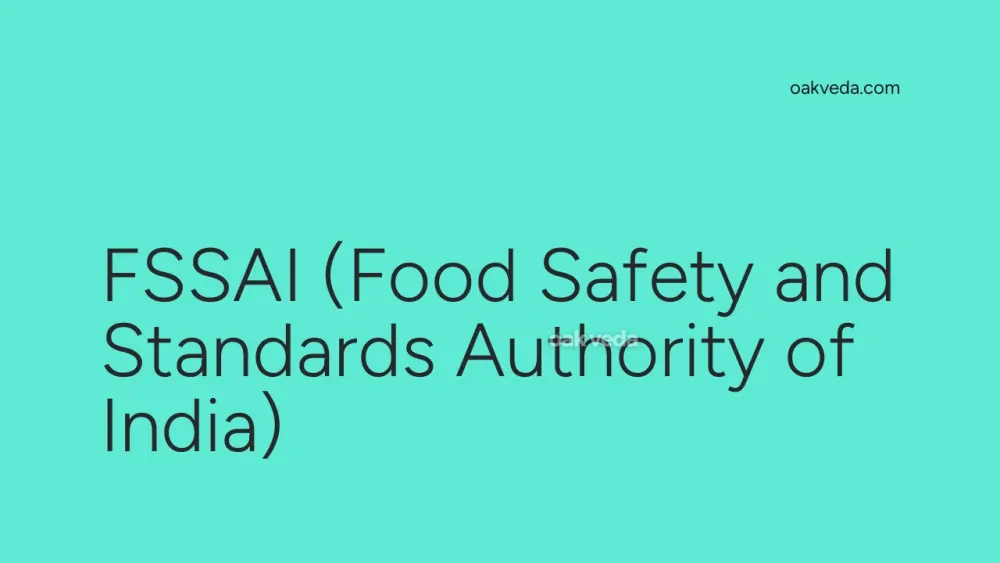
What is the Full Form of FSSAI?
FSSAI is the acronym for the Food Safety and Standards Authority of India. This organization plays a crucial role in maintaining food safety and quality standards across the country.
What is Food Safety and Standards Authority of India?
The Food Safety and Standards Authority of India (FSSAI) is a statutory body established under the Ministry of Health and Family Welfare, Government of India. Its primary objective is to ensure that safe and wholesome food is available to all citizens of India.
Origin and Development of FSSAI
FSSAI was established in 2006 under the Food Safety and Standards Act. This landmark legislation consolidated various food-related laws and regulations that were previously scattered across different ministries and departments. The creation of FSSAI marked a significant step towards modernizing India's food safety and regulatory framework.
How does FSSAI work?
FSSAI operates through a network of offices and laboratories spread across India. The organization's headquarters is located in New Delhi, with eight regional offices in major cities such as Mumbai, Chennai, and Kolkata. FSSAI works in collaboration with state food safety departments, accredited laboratories, and various stakeholders in the food industry to implement food safety standards and regulations.
Functions of FSSAI
The FSSAI performs several critical functions to ensure food safety and quality in India:
- Framing Regulations: FSSAI develops science-based food safety and standards regulations.
- Licensing and Registration: It grants licenses to food business operators and registers small food businesses.
- Risk Assessment: The authority conducts risk assessments and provides scientific advice on food safety matters.
- Testing and Surveillance: FSSAI oversees a network of food testing laboratories and conducts regular surveillance of food products.
- Enforcement: It coordinates with state food safety authorities to enforce food safety laws and regulations.
- Consumer Awareness: FSSAI runs various initiatives to educate consumers about food safety and healthy eating habits.
Applications of FSSAI
FSSAI's work has wide-ranging applications across the food industry and public health sector:
- Food Industry Compliance: All food businesses, from street vendors to large manufacturers, must comply with FSSAI standards and obtain necessary licenses.
- Import Regulation: FSSAI regulates the import of food products into India, ensuring they meet national standards.
- Public Health Protection: By setting and enforcing food safety standards, FSSAI plays a crucial role in protecting public health.
- Consumer Empowerment: Through initiatives like food labeling regulations, FSSAI empowers consumers to make informed food choices.
Features of FSSAI
Some key features of FSSAI include:
- Scientific Approach: FSSAI bases its standards and regulations on scientific evidence and risk assessment.
- Comprehensive Coverage: It covers all stages of the food supply chain, from production to distribution.
- Transparency: The authority maintains transparency in its operations and decision-making processes.
- Collaboration: FSSAI works closely with various national and international organizations to improve food safety standards.
Benefits of FSSAI
The establishment of FSSAI has brought numerous benefits to India's food ecosystem:
- Improved Food Safety: Stringent regulations and regular inspections have led to improved food safety standards across the country.
- Consumer Trust: FSSAI's efforts have increased consumer confidence in the safety and quality of food products.
- Industry Standardization: The food industry has become more organized and standardized due to FSSAI's regulations.
- Global Recognition: FSSAI's standards have helped Indian food products gain recognition and acceptance in international markets.
Limitations or Challenges of FSSAI
Despite its successes, FSSAI faces several challenges:
- Enforcement Challenges: Given India's vast and diverse food industry, ensuring compliance across the country is a significant challenge.
- Resource Constraints: Limited manpower and infrastructure sometimes hinder FSSAI's ability to conduct comprehensive food safety checks.
- Evolving Food Landscape: Keeping pace with rapidly changing food trends and technologies requires constant updating of regulations and standards.
Future Developments in FSSAI
FSSAI continues to evolve and adapt to meet the changing needs of India's food ecosystem. Some future developments may include:
- Technology Integration: Increased use of technology for food testing, traceability, and enforcement.
- Focus on Nutrition: Greater emphasis on promoting healthy diets and addressing issues like obesity and malnutrition.
- Strengthening Laboratory Network: Expanding and upgrading the network of food testing laboratories across the country.
- International Collaboration: Enhancing cooperation with international food safety organizations to align with global best practices.
FAQs on FSSAI Full Form
-
What is the full form of FSSAI? The full form of FSSAI is Food Safety and Standards Authority of India.
-
When was FSSAI established? FSSAI was established in 2006 under the Food Safety and Standards Act.
-
Is FSSAI certification mandatory for all food businesses? Yes, FSSAI certification is mandatory for all food businesses in India, including small vendors and large manufacturers.
-
How can I check if a product is FSSAI approved? Look for the FSSAI logo and license number on the product packaging.
-
Can FSSAI ban food products? Yes, FSSAI has the authority to ban food products that do not meet safety standards or pose health risks.
In conclusion, the Food Safety and Standards Authority of India (FSSAI) plays a vital role in ensuring the safety and quality of food in India. Through its various functions and initiatives, FSSAI continues to work towards its goal of ensuring safe and wholesome food for all Indian citizens.
You may be interested in:

